GMRC Review: Rendezvous with Rama by Arthur C. Clarke
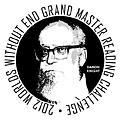 Jeremy Frantz (jfrantz) reviews SF/F books on his blog The Hugo Endurance Project where he has given himself just 64 weeks to read every Hugo Award winner. This is his seventh GMRC review to feature in the blog.
Jeremy Frantz (jfrantz) reviews SF/F books on his blog The Hugo Endurance Project where he has given himself just 64 weeks to read every Hugo Award winner. This is his seventh GMRC review to feature in the blog.
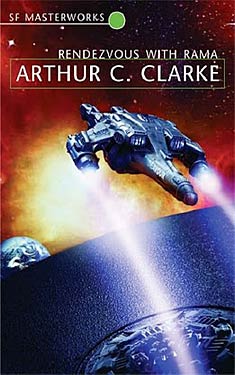 When a ten trillion ton asteroid wanders into the solar system, you take a second look. And when that asteroid turns out to be massive alien spacecraft, you really start to pay attention. This is precisely what happens in Rendezvous with Rama when the crew of the Endeavor ventures to board the vessel and unlock it’s secrets, whatever they may be.
When a ten trillion ton asteroid wanders into the solar system, you take a second look. And when that asteroid turns out to be massive alien spacecraft, you really start to pay attention. This is precisely what happens in Rendezvous with Rama when the crew of the Endeavor ventures to board the vessel and unlock it’s secrets, whatever they may be.
Did I just get smarter?
Of the two titles I’ve read, and especially in the case of Rama, I’ll say that Arthur C. Clarke has an interesting style. There were some truly slow passages, yet it was never boring. There were also some adrenaline fueled moments (including a fun spin on the classic defuse the bomb trope) but even at its most exciting it never stops feeling…clinical. The combination made Rama at once a fast-paced and just plain old fun-to-read book, but it also felt very deliberate, serious and real. You have fun and even feel a little…I don’t know, smarter for having turned the pages? I mean, it’s not that strange an idea, Clarke’s name is practically synonymous with excellence in science and Science Fiction literature.
GMRC Review: Childhood’s End by Arthur C. Clarke
 Scott Lazerus came to Worlds Without End looking for a good list of books. He found David Pringle’s Best 100 Science Fiction Novels list to his liking and is currently working his way through the list. He has posted a bunch of reviews for WWEnd including several for the GMRC. Be sure to check out Scott’s excellent blog series Forays into Fantasy too!
Scott Lazerus came to Worlds Without End looking for a good list of books. He found David Pringle’s Best 100 Science Fiction Novels list to his liking and is currently working his way through the list. He has posted a bunch of reviews for WWEnd including several for the GMRC. Be sure to check out Scott’s excellent blog series Forays into Fantasy too!
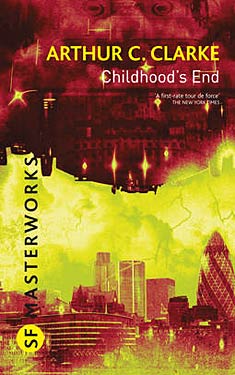 Childhood’s End never won an award, but the Hugo wasn’t awarded for 1954, and there were no other science fiction awards at the time. It does, however, show up on the biggest "best of" lists included on Worlds Without End for which it would be eligible (except the ISFDB 100, surprisingly). It continues to be considered a classic nearly six decades after its initial publication as a Ballantine paperback. I recall it from my teenage years as being considered, pretty much by acclimation of science fiction fans and professionals, one of the best and most important SF novels, and I agreed at the time. It was voted the eighth best SF novel of all time in the 1998 Locus Best SF Novels of All-Time poll. There’s always a danger revisiting SF this old—predictions have been proved wrong, writing styles tended to be less engaging, cultural influences from the writers’ own background lead to anachronistic attitudes among characters. So, how does Childhood’s End hold up? Will it continue to be pointed to as a classic of the field?
Childhood’s End never won an award, but the Hugo wasn’t awarded for 1954, and there were no other science fiction awards at the time. It does, however, show up on the biggest "best of" lists included on Worlds Without End for which it would be eligible (except the ISFDB 100, surprisingly). It continues to be considered a classic nearly six decades after its initial publication as a Ballantine paperback. I recall it from my teenage years as being considered, pretty much by acclimation of science fiction fans and professionals, one of the best and most important SF novels, and I agreed at the time. It was voted the eighth best SF novel of all time in the 1998 Locus Best SF Novels of All-Time poll. There’s always a danger revisiting SF this old—predictions have been proved wrong, writing styles tended to be less engaging, cultural influences from the writers’ own background lead to anachronistic attitudes among characters. So, how does Childhood’s End hold up? Will it continue to be pointed to as a classic of the field?
I suspect the answer to that last question will be "yes" for a long time to come. Sure, there are a few details that stick out as dating the novel. As in all ’50s (and quite a bit of later) science fiction, calculating and problem-solving computers are predicted, but not digital data storage and instant access to information. Despite extreme technological advances, people still use paper and photographic film. There is some reflexive sexism—sexual freedom and attitudes improve, but women still seem to be tied to their reproductive roles, while men are the "thinkers and doers." These details are noticeable, especially considering that Clarke is describing a future technological and social utopia, but they are very much in the background, and thus easy to ignore, since the novel’s themes and ideas are not much concerned with them.
Arthur C. Clarke‘s prose is little more than serviceable, but it does open up at times when describing the wondrousness of alien worlds, vistas of incomprehensible scale, or the sublimity of humanity’s evolution in the concluding section.
"Through the clash and tug of conflicting gravitational fields the planet travelled along the loops and curves of its inconceivably complex orbit, never retracing the same path. Every moment was unique; the configuration which the six suns now held in the heavens would not repeat itself this side of eternity. An even here there was life. Though the planet might be scorched by the central fires in one age, and frozen in the outer reaches in another, it was yet the home of intelligence. The great, many-faceted crystals stood grouped in intricate geometrical patterns, motionless in the eras of cold, growing slowly along the veins of mineral when the world was warm again. No matter if it took a thousand years for them to complete a thought. The universe was still young, and Time stretched endlessly before them…"
Such descriptions are especially attention-getting when contrasted with the straightforward prose more typical of the novel.
Characterization is minimal, as each major section of the novel introduces a few characters to play important roles or represent prevalent attitudes necessary to move the story forward. But these characters perform these roles well, and seem believable enough. In fact, given the nature of the story, I was expecting much less characterization in the usual sense, since no individual can have much "stage time" in a novel of around two-hundred fifty pages that covers a couple of centuries of human history. And the most important character in Childhood’s End is the human race itself, a point that becomes increasingly clear as the novel progress. It is humanity’s potential for "character development" that is at the heart of the book. Clarke is interested in the potential for human development. His ideas could have been presented in non-fiction form, but he chose to do so in the form of a novel. It could easily not have worked. The fact that it is able to present such big ideas, and still work well as a novel, is impressive.
Clarke seems to be commonly thought of as a writer more interested in technology than characters—the alien ship in Rendezvous with Rama; the space elevator in Fountains of Paradise—but the future depicted in Childhood’s End is not mainly technological. Rather, it is a step in human evolution, preceded by a social utopia (with a little help from some aliens).
The space race is proceeding, and humanity seems on the brink of war, when the Overlords arrive on Earth. Speaking through a single representative "supervisor"—Karellen, the only character to be involved in every stage of the story—the alien Overlords impose utopia on the human race. How would we respond to a truly benevolent occupation? Would we be angry that we could no longer fight wars, even if our conquerors also removed any possible reason for conflict? Technically, humanity was not entirely free, but individual freedom was not interfered with as long as no one harmed anyone else. And all material needs are met, so there is nothing to fight over. Empires often believe that they are improving the lives of those whom they conquer, and such attitudes are justifiably criticized. What if the conquerors are right?
Some object (especially on religious grounds) to the loss of freedom, but humanity soon settles gratefully into a "Golden Age."
"By the standards of all earlier ages, it was Utopia. Ignorance, disease, poverty and fear had virtually ceased to exist. The memory of war was fading into the past as a nightmare vanishes with the dawn; soon it would lie outside the experience of all living men. With the energies of mankind directed into constructive channels, the face of the world had been remade."
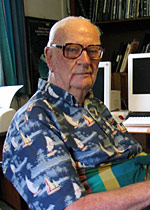 Production is largely automated, and resources previously used for war and defense are made available for construction and consumption. Crime is practically eliminated, since there is no poverty, and the Overlords can maintain complete surveillance over the planet. Leisure is greatly increased, psychological problems fall away, and rationality prevails. People can easily travel to wherever they want and live wherever they like (flying cars!). "It was a completely secular age… The creeds that had been based upon miracles and revelations had collapsed utterly." I find this sort of speculation fascinating, and I’m sure it’s a big part of the appeal of the novel, especially to younger readers. Would it really play out this way? It’s a hopeful thought, and does not seem impossible, given the circumstances. What if the world ran on truly rational principles? That is the question posed by the "tyranny" of the Overlords. But the sticky question of freedom remains. It is still not a perfect world, and nagging questions remain. What comes next for humanity, when there seems nothing to strive for? Why have the Overlords forbidden space exploration? What is their real motivation?
Production is largely automated, and resources previously used for war and defense are made available for construction and consumption. Crime is practically eliminated, since there is no poverty, and the Overlords can maintain complete surveillance over the planet. Leisure is greatly increased, psychological problems fall away, and rationality prevails. People can easily travel to wherever they want and live wherever they like (flying cars!). "It was a completely secular age… The creeds that had been based upon miracles and revelations had collapsed utterly." I find this sort of speculation fascinating, and I’m sure it’s a big part of the appeal of the novel, especially to younger readers. Would it really play out this way? It’s a hopeful thought, and does not seem impossible, given the circumstances. What if the world ran on truly rational principles? That is the question posed by the "tyranny" of the Overlords. But the sticky question of freedom remains. It is still not a perfect world, and nagging questions remain. What comes next for humanity, when there seems nothing to strive for? Why have the Overlords forbidden space exploration? What is their real motivation?
That last issue is addressed in the concluding part of the novel. The achievement of Utopia is not childhood’s end, but a final step in the fostering of the ultimate evolution to adulthood. It involves Clarke’s interpretation of the possible meaning of mysticism and psychic phenomena, the existence of a universal "Overmind," and the meaning of the Overlords’ task. Utopia will be left behind for a future humanity cannot yet comprehend. I’m tempted to quote some of the passages describing this, as they are among the best in the book, but suffice it to say that the final chapter of Childhood’s End remains one of the most gripping in all of science fiction.
Considering humanity itself as the main character of Childhood’s End, "characterization" is actually Clarke’s major strength in this novel. We follow the character from childhood to maturity—from an existence overly determined by emotion and impulse, to one governed by rationality, to "the end of Man… an end that repudiated both optimism and pessimism alike." I questioned the journey much of the way, as my cynical attitude wanted to intrude. I kept looking for the fatal flaw in Clarke’s arguments. It remains thought-provoking. About halfway through the novel, I gave up looking for narrative or philosophical flaws, and considered the possibilities…
SF/F Quotes: Arthur C. Clarke
“
Before you become too entranced with gorgeous gadgets and mesmerizing video displays, let me remind you that information is not knowledge, knowledge is not wisdom, and wisdom is not foresight. Each grows out of the other, and we need them all.
”
GMRC Review: Prelude to Space by Arthur C. Clarke
 Guest Blogger and WWEnd member, valashain, reviews science fiction and fantasy books on his blog Val’s Random Comments which we featured in a previous post: Five SF/F Book Blogs Worth Reading. Val has posted many great reviews to WWEnd and this is his second for the GMRC. Be sure to visit his site and let him know you found him here.
Guest Blogger and WWEnd member, valashain, reviews science fiction and fantasy books on his blog Val’s Random Comments which we featured in a previous post: Five SF/F Book Blogs Worth Reading. Val has posted many great reviews to WWEnd and this is his second for the GMRC. Be sure to visit his site and let him know you found him here.
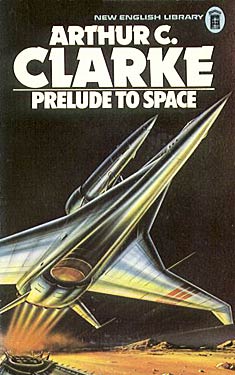 Prelude to Space by Arthur C. Clarke is my second read in the 2012 WWEnd Grand Master Reading Challenge. Last month I read Poul Anderson‘s Tau Zero (1970), which is one Anderson’s better known novels. For my second read I picked something a little less high profile. Prelude to Space is the first novel Arthur C. Clarke wrote and is generally not considered as good as Childhood’s End (1953), probably the most famous of Clarke’s early novels. The publication history of this story is not unusual for the period. Clarke wrote the novel in the space of a month in 1947 but it wasn’t until 1951 that the whole novel was published in magazine format by Galaxy Science Fiction. It was followed by a hardcover edition in 1953. What is atypical about it, is that the novel does not appear to be based on one of Clarke’s short stories. Although one of Clarke’s lesser works, it has been reprinted numerous times. The edition I have read was printed in 1977 and includes a "Post Apollo Preface", as Clarke himself puts it, written in 1969.
Prelude to Space by Arthur C. Clarke is my second read in the 2012 WWEnd Grand Master Reading Challenge. Last month I read Poul Anderson‘s Tau Zero (1970), which is one Anderson’s better known novels. For my second read I picked something a little less high profile. Prelude to Space is the first novel Arthur C. Clarke wrote and is generally not considered as good as Childhood’s End (1953), probably the most famous of Clarke’s early novels. The publication history of this story is not unusual for the period. Clarke wrote the novel in the space of a month in 1947 but it wasn’t until 1951 that the whole novel was published in magazine format by Galaxy Science Fiction. It was followed by a hardcover edition in 1953. What is atypical about it, is that the novel does not appear to be based on one of Clarke’s short stories. Although one of Clarke’s lesser works, it has been reprinted numerous times. The edition I have read was printed in 1977 and includes a "Post Apollo Preface", as Clarke himself puts it, written in 1969.
In the year 1978 humanity is ready to for the next step in exploration, the first manned mission to the Moon is about to leave Earth. Historian Drik Alexson is sent to London, where the headquarters of Interplanetary, the non-profit organization coordinating the mission, is located. He is to document the event, that will no doubt be considered one of the turning points in human history. Although Alexson is supposed to be an impartial observer, he can’t help but by swept away by the magnitude of the effort and the impact it will have on human society. As the launch date nears, Alexson realizes that this event will be his life’s work as a historian.
Although science fiction is much more about exploring ideas and what they might mean to society than actually predicting the future, seeing how many details Clarke got wrong in this novel is still almost as interesting as the story itself. Where Clarke goes for private enterprise as the driving factor and assumes the memory of the Second World War will change the way people see armed conflict, in reality is was the tension between East and West that gave space exploration a huge boost. The need for the US to prove it could outdo their Soviet rivals resulted in a moon landing nine years before the one Clarke describes, using very different rockets to get there. Many of Clarke’s novels describe futures where science, logic and reason triumph over the petty squabbles, religious dogmas and ideological differences to achieve a peaceful and stable way of running the planet. In Prelude to Space this is treated as inevitable. Would that Clarke had been right on that point.
Another thing that struck me about Clarke’s scenario is the use of atomic energy to power these rockets. These days, radioactivity makes people very nervous, and rightly so as recent events in Fukushima have shown us. Some horrendous experiments were carried out testing nuclear devices in the 1950s, clearly showing that the long term impact of radioactive substances released into he environment was still very poorly understood at the time this novel was written. The radioactivity around the launch site in the Australian desert is mentioned several times but not considered a matter of great concern. It might be technically possible to limit the risk of radioactive contamination, even in the event of a launch failure, but somehow I think it would be very hard to convince the general public that it’d be safe these days.
 Clarke’s futures are generally pretty optimistic, sometimes even utopian, and this novel is no exception. Prelude to Space is something of a cross between a love letter to and an advertisement for space exploration. Clarke carefully connects the historical desire to travel to the stars, early science fiction and lots of technological developments, all leading to this one momentous occasion. The moment when humanity will finally leave its cradle and first set foot on a strange world. A first step on a path from which there will be no turning back. Where that path will lead, Clarke doesn’t dare predict but he seems to be quite sure it is one we must take to ensure survival of the species. The author may overdo it a little in the text but his enthusiasm is contagious. It was almost enough to make me wonder why the hell we are not on our way to Mars already.
Clarke’s futures are generally pretty optimistic, sometimes even utopian, and this novel is no exception. Prelude to Space is something of a cross between a love letter to and an advertisement for space exploration. Clarke carefully connects the historical desire to travel to the stars, early science fiction and lots of technological developments, all leading to this one momentous occasion. The moment when humanity will finally leave its cradle and first set foot on a strange world. A first step on a path from which there will be no turning back. Where that path will lead, Clarke doesn’t dare predict but he seems to be quite sure it is one we must take to ensure survival of the species. The author may overdo it a little in the text but his enthusiasm is contagious. It was almost enough to make me wonder why the hell we are not on our way to Mars already.
This is the tenth novel by Clarke I have read, spanning his entire career, and from those it seems obvious that Clarke didn’t change his approach to writing a whole lot during his seven decades as a published author. Some sections of the novel are highly technical, with the science of space travel the main character. Alexson is the vehicle that allows Clarke to show the events leading up to the launch from up close, but he seems to have very little interest in the man himself (perhaps not altogether surprising, he strikes me as a bright but not very interesting fellow). You don’t read Clarke for his well rounded characters or complex plots but for the hard science and Clarke’s visions of what they may mean for future society.
Sixty-five years after it was written Prelude to Space is badly dated in just about every aspect of the story. From the technical developments to the blatant sexism that plagued science fiction in those days. On top of that, Clarke wrote a novel that reads like propaganda for a space program. It is very effective propaganda though. Despite all the novel’s flaws, you can’t help but be caught up in the excitement of the enterprise and the possibilities of space travel, many of which still haven’t been realized. Clarke’s optimism has been proven unfounded in some ways but the drive to explore space is still there. This novel might well have been an inspiration to some teenager in the 1950s to pursue a career in physics or astronomy. Clarke has gone on to write more challenging novels but for a debut, it’s a decent read.



















 Full Details
Full Details

